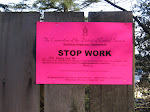Scandalously indefensible, this colossally corrupt government breaks yet another law with impunity.
Four years of B.C. cabinet e-mails erased
Electronic records requested by defence aren't recoverable, lawyer representing Premier in BC Rail case tells court
Mark Hume
GLOBE and MAIL
Vancouver — Tuesday, Jun. 23, 2009 05:01AM EDT
The provincial government may have destroyed all cabinet e-mails between 2001 and 2005, opening a huge gap in the official record despite a law that electronic files must be kept for at least seven years, the Supreme Court of British Columbia has learned.
Michael Bolton, who is defending one of three former government employees in a political corruption case stemming from the sale of BC Rail, said outside court Monday he was stunned to hear the e-mails aren't available.
“This is troubling…this potentially is a very serious matter. We never expected this,” said Mr. Bolton, who is defending Dave Basi, who was a ministerial aid in 2003 when the government sold BC Rail to CN Rail for $1-billion. The controversial deal, which was the first big privatization undertaken by the B.C. Liberals, closed in 2004.
In an application filed two weeks ago defence lawyers sought the disclosure of the e-mail records of several members of cabinet, key executives, and of Premier Gordon Campbell, from June, 2001 to 2005.
But George Copley, a lawyer representing the Executive Council, which includes both the Premier's office and cabinet, told court the electronic records aren't recoverable.
Mr. Copley said officials who oversaw a search reported the material couldn't be found, implying it had all been purged from the data system.
“There are backup tapes. They are kept for a certain period of time…[but] in the normal course of operation they don't keep more than 13 months backup,” he told Justice Elizabeth Bennett.
Kevin McCullough, who is defending co-accused Bob Virk, a former aid to the transportation minister, told court he couldn't believe what he was hearing.
“It's vanishing point,” he said. “Everything is gone. The records are irrecoverable.”
Mr. McCullough said government officials should be called to explain why the material isn't available.
But Justice Bennett said she was reluctant to do that, because the defence has yet to establish that the material is relevant.
“I'm not keen on having these individuals [responsible for managing government records] cross-examined…If the documents are not recoverable it doesn't mean anything unless you [first] establish likely relevance,” she said.
Justice Bennett told the defence to argue the relevance issue Tuesday, while submitting a set of written questions to Mr. Copley to get more details on what exactly was done to search the government records.
Leonard Krog, NDP justice critic, said it is “extremely troubling” that important government files may have been destroyed.
“The Document Disposal Act requires that [electronic records] be kept for seven years,” he said. “It raises incredible suspicions and someone farther up the political chain that Mr. Copley is going to have to appear in court and explain what happened.”
The government of B.C. has a detailed protocol covering both the preservation and destruction of its records.
Formal records can be destroyed, but only after the action has been approved by a public documents committee, the legislative assembly or the attorney general.
The Corporate Information Management Branch, which provides guidelines for government employees, states that e-mails must be copied to a central document management directory before individuals delete them from their personal files.
The guidelines say only “transitory” e-mails, which are clearly trivial in nature, can be deleted by individuals.
“Examples of this type of e-mail would be ‘Is this morning's meeting still on?' ”
http://www.theglobeandmail.com/news/national/british-columbia/four-years-of-bc-cabinet-e-mails-erased/article1192835/



















